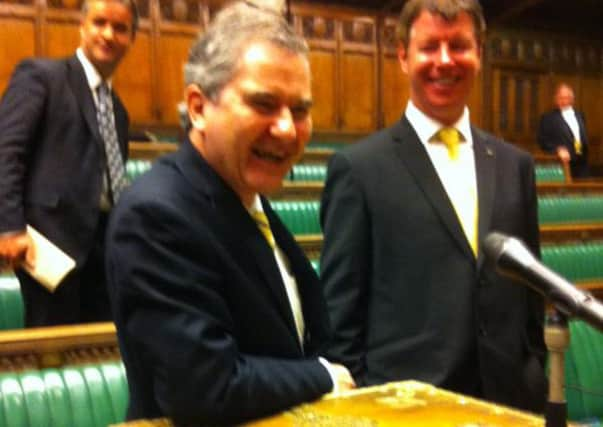Leaders: SNP must stick to its word over pledge


It does not seem real, at least not yet, even though we appear to have been party to every waking hour of the collective movements of the SNP’s bandwagon of 56 MPs since the sun came up last Friday. The smartphone camera never lies: those selfies truly were taken at the Dispatch Box.
Somewhere over the last few days, more than just our sense of order has become hazy.
Advertisement
Hide AdAdvertisement
Hide AdPrime Minister David Cameron arrives in Scotland today, with face-to-face talks expected to take place with First Minister Nicola Sturgeon. We know already the intentions of Ms Sturgeon: she will be pushing for more powers for the Scottish Parliament, and has warned that public demand for a second independence referendum could be shaped by the Conservative government’s response. She talks now of a new “democratic mandate” for change.
There is no need to read between the lines. But what is not so clear is how Scotland’s constitutional arrangement is back on the table, after a four-month general election campaign during which Ms Sturgeon was at pains to stress that the constitution was not an issue.
Now we also have the devolution (further powers) committee of the Scottish Parliament reporting that plans for new Holyrood powers fall short of the recommendations made by the Smith Commission. We have reached the point in a matter of just a few days where the Smith Commission’s post-referendum proposals, arrived at by a cross-party group and agreed to by the SNP’s representatives, are apparently no longer good enough. The story now goes that the general election has delivered a mandate for further constitutional change, despite all previous denials that the constitution was on the agenda.
It is not difficult to envisage the next move in this game. Mr Cameron rejects calls for more powers, and the SNP claims this is evidence that the Conservative government is ignoring the voice of the Scottish people.
If the SNP is unhappy with the Smith Commission’s proposals, it cannot forget that it signed up to them. Events have overtaken the Smith Commission, we are told. Yet while there has been significant change, that was not the result of the SNP vowing to rip up the Smith Commission and start again.
Ms Sturgeon either now believes – post-election – that she has a mandate to pursue this line or thinks she can now credibly portray last week’s success as a mandate to make political capital. But the reality is that today’s SNP’s agenda does not honour last week’s pre-election pledge.
Scales tip in favour of fishermen
WE have so often heard dire warnings about the death of the Scottish fishing industry that it is refreshing to be able to report far more encouraging news today.
Not only has the value of fish and shellfish landed by Scottish boats hit an all-time high, with a year-on-year increase of 20 per cent, but the quantity caught also increased by nearly a third.
Advertisement
Hide AdAdvertisement
Hide AdFor many years, the story of the Scottish fishing industry has been of declining stocks and resultant declining fleets. Where once an entire coastline was dotted with fishing fleets and villages, now the industry only operates out of a handful of Scottish ports. The Scottish fishing sector has shrunk by two-thirds in the past 40 years.
Today, however, there is reason to be optimistic. The key has been, and continues to be, sustaining stocks. Industry leaders say there is evidence that the safeguarding of stocks is working, and this traditional industry is showing real signs of recovery as a result.
This has come too late for many fishermen who have had to leave the industry, often at great financial loss when a boat is no longer required, and no-one pretends that there are not further important challenges ahead. In particular, these include the ongoing controversy over discard regulations, which leaders say remain a serious threat to the industry’s continued viability.
But after an extended narrative of doom and gloom – much of it justified at the time – there is great heart to be taken from quality and quantity of the harvest that fishing has produced over the past year. Plenty more fish in the sea? Let’s hope so.